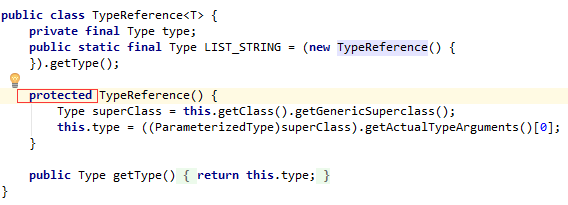fastJson对于json格式字符串的解析主要用到了一下三个类:
JSON:fastJson的解析器,用于JSON格式字符串与JSON对象及javaBean之间的转换。
JSONObject:fastJson提供的json对象。
JSONArray:fastJson提供json数组对象。
我们可以把JSONObject当成一个Map<String,Object>来看,只是JSONObject提供了更为丰富便捷的方法,方便我们对于对象属性的操作。我们看一下源码。

同样我们可以把JSONArray当做一个List<Object>,可以把JSONArray看成JSONObject对象的一个集合。

此外,由于JSONObject和JSONArray继承了JSON,所以说也可以直接使用两者对JSON格式字符串与JSON对象及javaBean之间做转换,不过为了避免混淆我们还是使用JSON。
首先定义三个json格式的字符串,作为我们的数据源。
//json字符串-简单对象型 private static final String JSON_OBJ_STR = "{"studentName":"lily","studentAge":12}"; //json字符串-数组类型 private static final String JSON_ARRAY_STR = "[{"studentName":"lily","studentAge":12},{"studentName":"lucy","studentAge":15}]"; //复杂格式json字符串 private static final String COMPLEX_JSON_STR = "{"teacherName":"crystall","teacherAge":27,"course":{"courseName":"english","code":1270},"students":[{"studentName":"lily","studentAge":12},{"studentName":"lucy","studentAge":15}]}";
示例1:JSON格式字符串与JSON对象之间的转换。
示例1.1-json字符串-简单对象型与JSONObject之间的转换
/** * json字符串-简单对象型与JSONObject之间的转换 */ public static void testJSONStrToJSONObject(){System.out.println(jsonObject.getString("studentName")+":"+jsonObject.getInteger("studentAge"));JSONObject jsonObject </span>=<span style="color: #000000"> JSON.parseObject(JSON_OBJ_STR); </span><span style="color: #008000">//</span><span style="color: #008000">JSONObject jsonObject1 = JSONObject.parseObject(JSON_OBJ_STR); </span><span style="color: #008000">//</span><span style="color: #008000">因为JSONObject继承了JSON,所以这样也是可以的</span>}</span></pre>
示例1.2-json字符串-数组类型与JSONArray之间的转换
/** * json字符串-数组类型与JSONArray之间的转换 */ public static void testJSONStrToJSONArray(){JSONArray jsonArray </span>=<span style="color: #000000"> JSON.parseArray(JSON_ARRAY_STR); </span><span style="color: #008000">//</span><span style="color: #008000">JSONArray jsonArray1 = JSONArray.parseArray(JSON_ARRAY_STR);</span><span style="color: #008000">//</span><span style="color: #008000">因为JSONArray继承了JSON,所以这样也是可以的 </span><span style="color: #008000">//</span><span style="color: #008000">遍历方式1</span> <span style="color: #0000ff">int</span> size =<span style="color: #000000"> jsonArray.size(); </span><span style="color: #0000ff">for</span> (<span style="color: #0000ff">int</span> i = 0; i < size; i++<span style="color: #000000">){ JSONObject jsonObject </span>=<span style="color: #000000"> jsonArray.getJSONObject(i); System.out.println(jsonObject.getString(</span>"studentName")+":"+jsonObject.getInteger("studentAge"<span style="color: #000000">)); } </span><span style="color: #008000">//</span><span style="color: #008000">遍历方式2</span> <span style="color: #0000ff">for</span><span style="color: #000000"> (Object obj : jsonArray) { JSONObject jsonObject </span>=<span style="color: #000000"> (JSONObject) obj; System.out.println(jsonObject.getString(</span>"studentName")+":"+jsonObject.getInteger("studentAge"<span style="color: #000000">)); } }</span></pre>
示例1.3-复杂json格式字符串与JSONObject之间的转换
/** * 复杂json格式字符串与JSONObject之间的转换 */ public static void testComplexJSONStrToJSONObject(){String teacherName = jsonObject.getString("teacherName"); Integer teacherAge = jsonObject.getInteger("teacherAge"); JSONObject course = jsonObject.getJSONObject("course"); JSONArray students = jsonObject.getJSONArray("students");JSONObject jsonObject </span>=<span style="color: #000000"> JSON.parseObject(COMPLEX_JSON_STR); </span><span style="color: #008000">//</span><span style="color: #008000">JSONObject jsonObject1 = JSONObject.parseObject(COMPLEX_JSON_STR);</span><span style="color: #008000">//</span><span style="color: #008000">因为JSONObject继承了JSON,所以这样也是可以的</span>}</span></pre>
示例2:JSON格式字符串与javaBean之间的转换。
首先,我们针对数据源所示的字符串,提供三个javaBean。
public class Student {</span><span style="color: #0000ff">private</span><span style="color: #000000"> String studentName; </span><span style="color: #0000ff">private</span><span style="color: #000000"> Integer studentAge; </span><span style="color: #0000ff">public</span><span style="color: #000000"> String getStudentName() { </span><span style="color: #0000ff">return</span><span style="color: #000000"> studentName; } </span><span style="color: #0000ff">public</span> <span style="color: #0000ff">void</span><span style="color: #000000"> setStudentName(String studentName) { </span><span style="color: #0000ff">this</span>.studentName =<span style="color: #000000"> studentName; } </span><span style="color: #0000ff">public</span><span style="color: #000000"> Integer getStudentAge() { </span><span style="color: #0000ff">return</span><span style="color: #000000"> studentAge; } </span><span style="color: #0000ff">public</span> <span style="color: #0000ff">void</span><span style="color: #000000"> setStudentAge(Integer studentAge) { </span><span style="color: #0000ff">this</span>.studentAge =<span style="color: #000000"> studentAge; }}
public class Course {</span><span style="color: #0000ff">private</span><span style="color: #000000"> String courseName; </span><span style="color: #0000ff">private</span><span style="color: #000000"> Integer code; </span><span style="color: #0000ff">public</span><span style="color: #000000"> String getCourseName() { </span><span style="color: #0000ff">return</span><span style="color: #000000"> courseName; } </span><span style="color: #0000ff">public</span> <span style="color: #0000ff">void</span><span style="color: #000000"> setCourseName(String courseName) { </span><span style="color: #0000ff">this</span>.courseName =<span style="color: #000000"> courseName; } </span><span style="color: #0000ff">public</span><span style="color: #000000"> Integer getCode() { </span><span style="color: #0000ff">return</span><span style="color: #000000"> code; } </span><span style="color: #0000ff">public</span> <span style="color: #0000ff">void</span><span style="color: #000000"> setCode(Integer code) { </span><span style="color: #0000ff">this</span>.code =<span style="color: #000000"> code; }}
public class Teacher {</span><span style="color: #0000ff">private</span><span style="color: #000000"> String teacherName; </span><span style="color: #0000ff">private</span><span style="color: #000000"> Integer teacherAge; </span><span style="color: #0000ff">private</span><span style="color: #000000"> Course course; </span><span style="color: #0000ff">private</span> List<Student><span style="color: #000000"> students; </span><span style="color: #0000ff">public</span><span style="color: #000000"> String getTeacherName() { </span><span style="color: #0000ff">return</span><span style="color: #000000"> teacherName; } </span><span style="color: #0000ff">public</span> <span style="color: #0000ff">void</span><span style="color: #000000"> setTeacherName(String teacherName) { </span><span style="color: #0000ff">this</span>.teacherName =<span style="color: #000000"> teacherName; } </span><span style="color: #0000ff">public</span><span style="color: #000000"> Integer getTeacherAge() { </span><span style="color: #0000ff">return</span><span style="color: #000000"> teacherAge; } </span><span style="color: #0000ff">public</span> <span style="color: #0000ff">void</span><span style="color: #000000"> setTeacherAge(Integer teacherAge) { </span><span style="color: #0000ff">this</span>.teacherAge =<span style="color: #000000"> teacherAge; } </span><span style="color: #0000ff">public</span><span style="color: #000000"> Course getCourse() { </span><span style="color: #0000ff">return</span><span style="color: #000000"> course; } </span><span style="color: #0000ff">public</span> <span style="color: #0000ff">void</span><span style="color: #000000"> setCourse(Course course) { </span><span style="color: #0000ff">this</span>.course =<span style="color: #000000"> course; } </span><span style="color: #0000ff">public</span> List<Student><span style="color: #000000"> getStudents() { </span><span style="color: #0000ff">return</span><span style="color: #000000"> students; } </span><span style="color: #0000ff">public</span> <span style="color: #0000ff">void</span> setStudents(List<Student><span style="color: #000000"> students) { </span><span style="color: #0000ff">this</span>.students =<span style="color: #000000"> students; }}
json字符串与javaBean之间的转换推荐使用 TypeReference<T> 这个类,使用泛型可以更加清晰,当然也有其它的转换方式,这里就不做探讨了。
示例2.1-json字符串-简单对象型与javaBean之间的转换
/** * json字符串-简单对象与JavaBean_obj之间的转换 */ public static void testJSONStrToJavaBeanObj(){System.out.println(student.getStudentName()+":"+student.getStudentAge());Student student </span>= JSON.parseObject(JSON_OBJ_STR, <span style="color: #0000ff">new</span> TypeReference<Student><span style="color: #000000">() {}); </span><span style="color: #008000">//</span><span style="color: #008000">Student student1 = JSONObject.parseObject(JSON_OBJ_STR, new TypeReference<Student>() {});</span><span style="color: #008000">//</span><span style="color: #008000">因为JSONObject继承了JSON,所以这样也是可以的</span>}</span></pre>
示例2.2-json字符串-数组类型与javaBean之间的转换
/** * json字符串-数组类型与JavaBean_List之间的转换 */ public static void testJSONStrToJavaBeanList(){ArrayList</span><Student> students = JSON.parseObject(JSON_ARRAY_STR, <span style="color: #0000ff">new</span> TypeReference<ArrayList<Student>><span style="color: #000000">() {}); </span><span style="color: #008000">//</span><span style="color: #008000">ArrayList<Student> students1 = JSONArray.parseObject(JSON_ARRAY_STR, new TypeReference<ArrayList<Student>>() {});</span><span style="color: #008000">//</span><span style="color: #008000">因为JSONArray继承了JSON,所以这样也是可以的</span> <span style="color: #0000ff">for</span><span style="color: #000000"> (Student student : students) { System.out.println(student.getStudentName()</span>+":"+<span style="color: #000000">student.getStudentAge()); } }</span></pre>
示例2.3-复杂json格式字符串与与javaBean之间的转换
/** * 复杂json格式字符串与JavaBean_obj之间的转换 */ public static void testComplexJSONStrToJavaBean(){Teacher teacher </span>= JSON.parseObject(COMPLEX_JSON_STR, <span style="color: #0000ff">new</span> TypeReference<Teacher><span style="color: #000000">() {}); </span><span style="color: #008000">//</span><span style="color: #008000">Teacher teacher1 = JSON.parseObject(COMPLEX_JSON_STR, new TypeReference<Teacher>() {});</span><span style="color: #008000">//</span><span style="color: #008000">因为JSONObject继承了JSON,所以这样也是可以的</span> String teacherName =<span style="color: #000000"> teacher.getTeacherName(); Integer teacherAge </span>=<span style="color: #000000"> teacher.getTeacherAge(); Course course </span>=<span style="color: #000000"> teacher.getCourse(); List</span><Student> students =<span style="color: #000000"> teacher.getStudents(); }</span></pre>
对于TypeReference<T>,由于其构造方法使用 protected 进行修饰,所以在其他包下创建其对象的时候,要用其实现类的子类:new TypeReference<Teacher>() {}

此外的:
1,对于JSON对象与JSON格式字符串的转换可以直接用 toJSONString()这个方法。
2,javaBean与JSON格式字符串之间的转换要用到:JSON.toJSONString(obj);
3,javaBean与json对象间的转换使用:JSON.toJSON(obj),然后使用强制类型转换,JSONObject或者JSONArray。
最后说一点,我们作为程序员,研究问题还是要仔细深入一点的。当你对原理了解的有够透彻,开发起来也就得心应手了,很多开发中的问题和疑惑也就迎刃而解了,而且在面对其他问题的时候也可做到触类旁通。当然在开发中没有太多的时间让你去研究原理,开发中要以实现功能为前提,可等项目上线的后,你有大把的时间或者空余的时间,你大可去刨根问底,深入的去研究一项技术,为觉得这对一名程序员的成长是很重要的事情。
